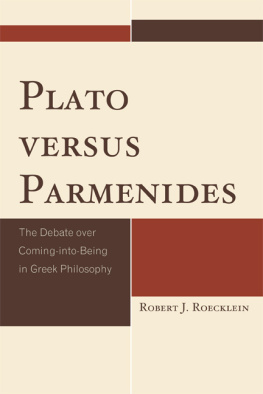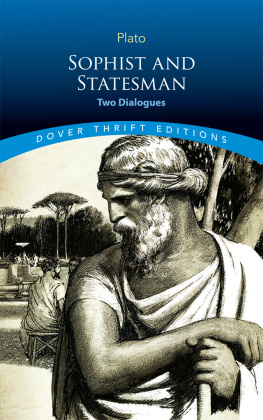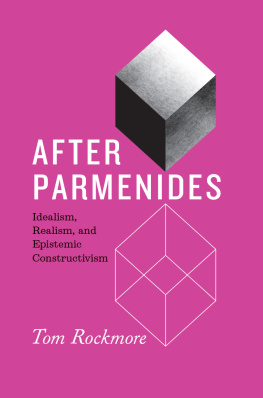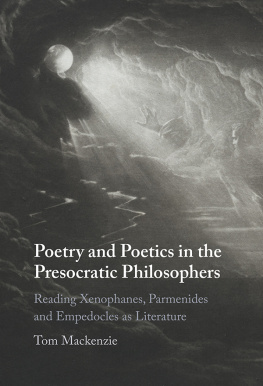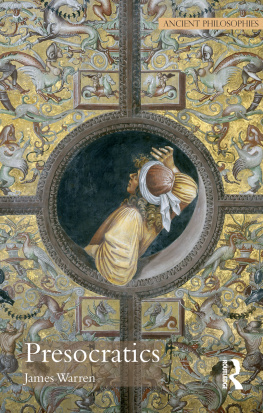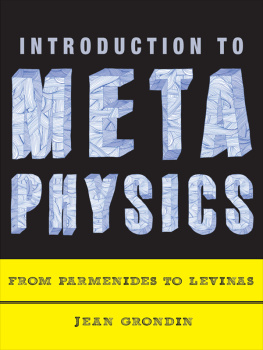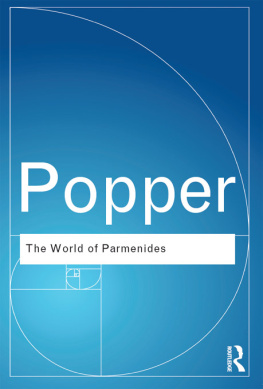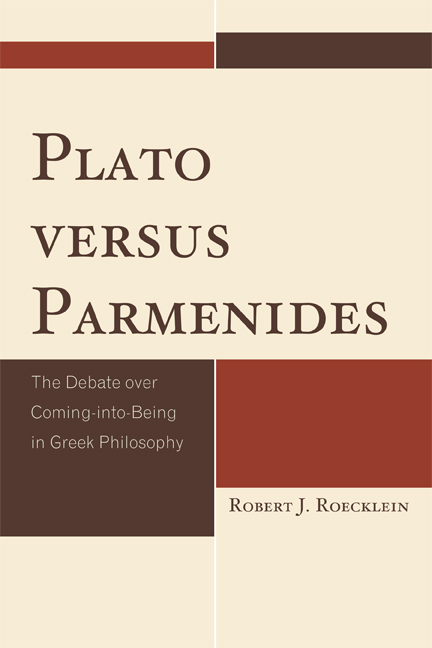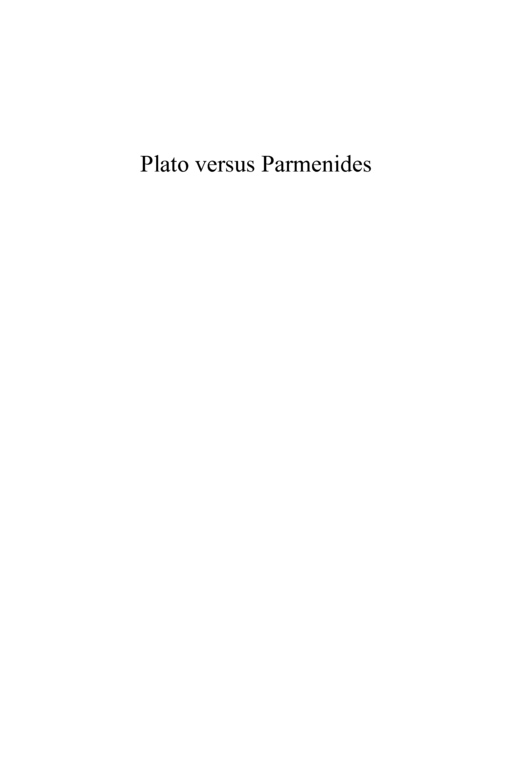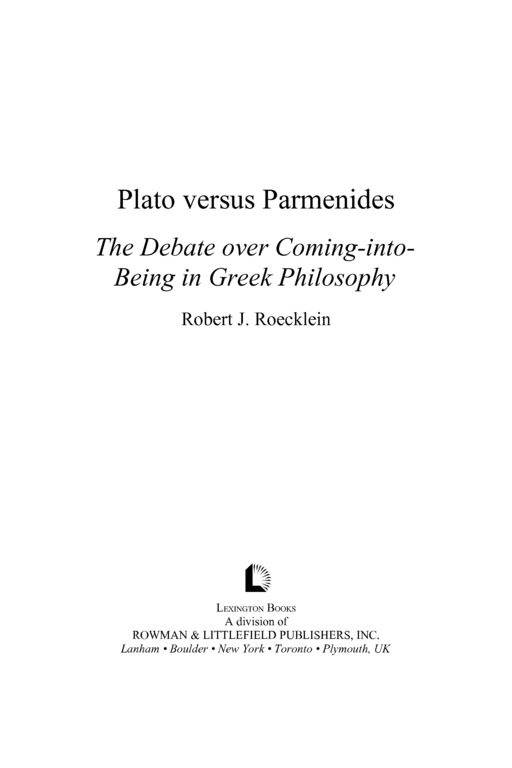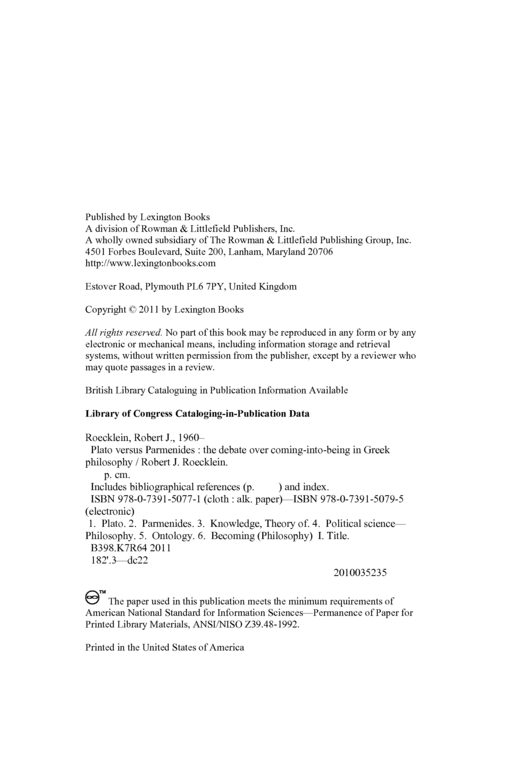Contents
Acknowledgments
Introduction
| 2 | Parmenides and the Milesian Philosophies: Nothing Comes from NothingPhysics or Logic? |
| 3 | Parmenides Influence on Empedocles and Anaxagoras |
| 4 | Platos Socrates and His Theory of Causation |
| 5 | The Parmenides : Platos Proof of Coming to Be |
| 6 | The Theaetetus : Platos Proof That the Objects of Knowledge Are Indivisible |
Bibliography
Index
Acknowledgments
This book has been long in the making. I would first of all like to thank Dr. Richard Aquila, then director for the School of Humanities and Social Sciences at Penn State Erie, the Behrend College, for helping to make my research possible. I am deeply grateful to the political science department here at Behrend as well: Dr. Robert Speel, chair; Dr. John Gamble, Distinguished Professor of International Law; Dr. Zachary Irwin; Dr. Chris Cook; and Dr. Celise Schneider.
I have often worked out the substance of the arguments presented in this work as a teacher in undergraduate classes in political philosophy. My students have made a very significant contribution to my own intellectual development. It has been a privilege to teach them. I would like to recognize the following students now, with thanks: Anthony Bango, Michael Barlett, Kevin Belknap, Mallory Blasic, Jacob Bowen, Ian Brigham, Christopher Brown, Adam Cline, Christopher Cox, Adam Curtis, Jackson Donahue, Megan Dunn, Brian Forfa, Jason Golebieski, Zach Goncz, Benjamin Haire, Katie Kelecseney, Jason Kinsel, Evan Koser, Greg Lane, Justin Lewis, Michael Long, Brian McCann, Austin Muckinhaupt, Olga Nacalaban, Jerry Pohl, Benjamin Rodgers, Zoe Rose, Craig Sanders, Victor Sciarinno, Christopher Sinclair, John Snyder, Joshua Snyder, Joshua Testa, Tameka Tilliman, Jesse Torba, Chad Work, and Grant Yochim.
Dr. Richard Mester, professor emeritus in philosophy here at Behrend, has offered me support and encouragement. Dr. Patrick Moloney of Victoria University in New Zealand has been an indefatigable sounding board, truly indispensable to my progress. This project could not have succeeded without the great assistance I received from Dr. Stephen Eric Bronner, professor at Rutgers University, and Dr. Michael Thompson of William Paterson University. The gratitude I feel toward these individuals would be hard to overstate.
The late Wilson Carey McWilliams of Rutgers University taught me how to be a scholar, when I wrote a dissertation under his supervision. He is warmly remembered as I compose this page. Ms. Jana Wilson, my editor at Lexington Books, has been infinitely skillful in guiding this book through to its publication, and relentlessly supportive. I am very much indebted to her.
The library staff here at Penn State Behrend has been unfailingly efficient and generous with their time: Patience Simmonds, Jane Ingold, Russ Hall, and Patty Mrozowski have helped to make this work possible.
There are more personal thanks to render to some individuals who helped me to develop my interest in philosophy many years ago. I cannot think of anyone more important to that development than Guy Barudin, who patiently helped me to strive for the intellectual fulfillment of certain ideas. David Hausman, another friend of long standing, has provided me with very strong support. Both of these individuals have my warm thanks.
S. Ray Skean and Michael Cain have provided me with safe harbors of friendship during challenging times. My greatest debt is to my best friend, Mr. John Fragala, whose steady perspective has lent me wisdom.
My sister, Ann Marie Rice; my brother, Neil C. Roecklein; my brother-in-law, Kevin Rice Sr.; and my nephews Kevin Jr. and Christopher well know of my feelings for them. Odysseus at last returned from his journey. Many a poppy field, many a Scylla and Charybdis, have been sidestepped along my way. I found my bearings with help from Athens, as might many others.
Introduction
Therefore, it is right that what is should not be imperfect; for it is not deficientif it were it would be deficient in everything. The same thing is there to be thought and is why there is thought. For you will not find thinking without what is, in all that has been said. For there neither is nor will be anything else besides what is, since Fate has fettered it to be whole and changeless. Therefore it has been named all the names which mortals have laid down believing them to be truecoming to be and perishing, being and not-being, changing place and altering in bright color.
Parmenides
There can be no doubt that over time, the academic division of labor has made it possible for us to learn many things that would otherwise be beyond our grasp. When philosophy was first discovered and practiced, however, such a division of labor was not in effect. To the contrary: in the cases of Parmenides and Plato, the contemporary specializations known as epistemology and political theory were anchored together, as a single foundation for thought. It is important to invoke such a perspective, in order for our own thought to reach these objects of investigation.
The work of Parmenides and Plato encompasses a breadth of intellectual ground which is almost too vast to calculate. However, on one issue, these two thinkers and the debate between them were epochal: a debate over the relationship between ordinary opinions, and the substance of philosophy or science (perfect or exact knowledge). Parmenides constructs a science which is premised upon the exclusion of ordinary opinion in matters of evidence and truth of fact; by contrast, Plato, in the formulation of his science, regards the ordinary opinions as the first foundation of facts to be brought into evidence. In other words, as regards the pursuit of the truth and the mighty authority that this must hold, the ordinary opinions can be seen to occupy an almost directly opposed status in the philosophies of Parmenides and Plato. The major division of opinion between these philosophic giants, for the present purpose, comes to rest upon the issue of coming-into-being, a preoccupation of the Greeks even during the pre-philosophical era.
At the time when Plato began to formulate his own arguments, the landscape of Greek intellectual culture had been hugely shaped by Parmenides. Scholars are effectively unanimous in this point of view. The thrust of Parmenides argument, however, has not always been traced out in its fullness, especially in its political implications. At the root of Parmenides argument is his denial that it is possible for true coming-into-being to occur in nature. As scholars have exhaustively studied, Parmenides argument imposed a problem that all subsequent philosophers had to reckon with, as if it had become the fate of Greek thinkers to labor under a heavy, even almost a Sisyphean burden.

